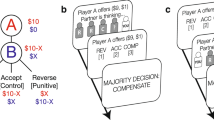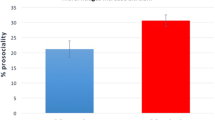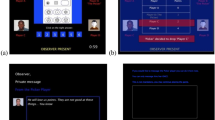Abstract
It has long been known that advocating for a cause can alter the advocate’s beliefs. Yet a guiding assumption of many advocates is that the biasing effect of advocacy is controllable. Lawyers, for instance, are taught that they can retain unbiased beliefs while advocating for their clients and that they must do so to secure just outcomes. Across ten experiments (six preregistered; N = 3,104) we show that the biasing effect of advocacy is not controllable but automatic. Merely incentivizing people to advocate altered a range of beliefs about character, guilt and punishment. This bias appeared even in beliefs that are highly stable, when people were financially incentivized to form true beliefs and among professional lawyers, who are trained to prevent advocacy from biasing their judgements.
This is a preview of subscription content, access via your institution
Access options
Access Nature and 54 other Nature Portfolio journals
Get Nature+, our best-value online-access subscription
$29.99 / 30 days
cancel any time
Subscribe to this journal
Receive 12 digital issues and online access to articles
$119.00 per year
only $9.92 per issue
Buy this article
- Purchase on Springer Link
- Instant access to full article PDF
Prices may be subject to local taxes which are calculated during checkout

Similar content being viewed by others
Data availability
The data that support the findings of this study are available at https://osf.io/ewv2a/.
Code availability
The custom code that supports the findings of this study is available at https://osf.io/ewv2a/.
Change history
18 September 2020
In the version of this article originally published, there was a typographic error in the last sentence of the second paragraph. This has been corrected in the HTML and PDF versions.
References
Kahneman, D. Thinking, Fast and Slow (Macmillan, 2011).
Loewenstein, G., Issacharoff, S., Camerer, C. & Babcock, L. Self-serving assessments of fairness and pretrial bargaining. J. Leg. Stud. 22, 135–159 (1993).
Plato. (transl. Waterford, R.) Gorgias (Oxford Univ. Press, 1998).
Deflem, M. Sociology of Law: Visions of a Scholarly Tradition (Cambridge Univ. Press, 2008).
Perlman, A. M. A behavioral theory of legal ethics. Indiana Law J. 90, 1639–1669 (2015).
Kahan, D. M. Laws of cognition and the cognition of law. Cognition 135, 56–60 (2015).
Krieger, L. S. Institutional denial about the dark side of law school, and fresh empirical guidance for constructively breaking the silence. J. Leg. Educ. 52 (2002).
Bargh, J. A. in Handbook of Social Cognition Vol. 1 (eds Wyer, R. S. & Srull, T. K.) 1–40 (Erlbaum, 1994).
Bargh, J. A. in Unintended Thought (eds Uleman, J. S. & Bargh, J. A.) 3–51 (Guilford, 1989).
Melnikoff, D. E. & Bargh, J. A. The mythical number two. Trends Cogn. Sci. 22, 280–293 (2018).
Moors, A. & De Houwer, J. Automaticity: a theoretical and conceptual analysis. Psychol. Bull. 132, 297–326 (2006).
Bem, D. J. Self-perception: an alternative interpretation of cognitive dissonance phenomena. Psychol. Rev. 74, 183–200 (1967).
Festinger, L. & Carlsmith, J. M. Cognitive consequences of forced compliance. J. Abnorm. Soc. Psychol. 58, 203–210 (1959).
Higgins, E. T. & Rholes, W. S. Saying is believing: effects of message modification on memory and liking for the person described. J. Exp. Soc. Psychol. 14, 363–378 (1978).
Thompson, L. & Loewenstein, G. Egocentric interpretations of fairness and interpersonal conflict. Organ. Behav. Hum. Decis. Process. 51, 176–197 (1992).
Thompson, L. “They saw a negotiation”: partisanship and involvement. J. Pers. Soc. Psychol. 68, 839–853 (1995).
Vorberg, D., Mattler, U., Heinecke, A., Schmidt, T. & Schwarzbach, J. Different time courses for visual perception and action priming. Proc. Natl Acad. Sci. USA 100, 6275–6280 (2003).
Maniscalco, B., Bang, J. W., Iravani, L., Camps-Febrer, F. & Lau, H. Does response interference depend on the subjective visibility of flanker distractors? Atten. Percept. Psychophys. 74, 841–851 (2012).
Janis, I. L. & Gilmore, J. B. The influence of incentive conditions on the success of role playing in modifying attitudes. J. Pers. Soc. Psychol. 1, 17–27 (1965).
Fodor, J. A. The Modularity of Mind (MIT Press, 1983).
Melnikoff, D. E. & Bailey, A. H. Preferences for moral vs. immoral traits in others are conditional. Proc. Natl Acad. Sci. USA 115, E592–E600 (2018).
Ratner, K. G., Kaul, C. & Van Bavel, J. J. Is race erased? Decoding race from patterns of neural activity when skin color is not diagnostic of group boundaries. Soc. Cogn. Affect. Neurosci. 8, 750–755 (2012).
De Frietas, J., Cikara, M., Grossman, I. & Schlegel, R. Origins of the belief in good true selves. Trends Cogn. Sci. 21, 634–636 (2017).
Strohminger, N., Knobe, J. & Newman, G. The true self: a psychological concept distinct from the self. Perspect. Psychol. Sci. 12, 551–560 (2017).
De Frietas, J. & Cikara, M. Deep down my enemy is good: thinking about the true self reduces intergroup bias. J. Exp. Soc. Psychol. 74, 307–316 (2018).
De Frietas, J. et al. Consistent belief in a good true self in misanthropes and three interdependent cultures. Cogn. Sci. 42, 134–160 (2018).
Newman, G. E., De Frietas, J. & Knobe, J. Beliefs about the true self explain asymmetries based on moral judgment. Cogn. Sci. 39, 96–125 (2015).
Hogarth, R. Judgment and Choice 2nd edn (Wiley, 1987).
Kruglanski, A. W. Lay Epistemics and Human Knowledge: Cognitive and Motivational Bases (Plenum, 1989).
Shiffrin, R. M. & Schneider, W. Controlled and automatic human information processing II: perceptual learning, automatic attending and a general theory. Psychol. Rev. 84, 127–190 (1977).
Newman, G., Bloom, P. & Knobe, J. Value judgments and the true self. Pers. Soc. Psychol. Bull. 40, 203–216 (2014).
Haidt, J. The emotional dog and its rational tail: a social intuitionist approach to moral judgment. Psychol. Rev. 108, 814–834 (2001).
Tetlock, P. E. et al. People as intuitive prosecutors: the impact of social-control goals on attributions of responsibility. J. Exp. Soc. Psychol. 43, 195–209 (2007).
Baumeister, R. F. & Newman, L. S. Self-regulation of cognitive inference and decision processes. Pers. Soc. Psychol. Bull. 20, 3–19 (1994).
Bates, D., Machler, M., Bolker, B. M. & Walker, S. C. Fitting linear mixed effects models using lme4. J. Stat. Softw. 67, 1–48 (2015).
Moss, A. J. & Litman, L. After the bot scare: understanding what’s been happening with data collection on MTurk and how to stop it. Cloudprime https://blog.turkprime.com/after-the-bot-scare-understanding-whats-been-happening-with-data-collection-on-mturk-and-how-to-stop-it (2018).
Acknowledgements
We thank P. Ellsworth, A. Shanor, J. Sun, A. Irgens, C. Cusimano and L. Drayton for contributions that aided in the development of this manuscript. We declare no specific funding for this work.
Author information
Authors and Affiliations
Contributions
D.E.M. and N.S. conceptualized, designed and performed the research and wrote the paper. D.E.M. analysed the data.
Corresponding author
Ethics declarations
Competing interests
The authors declare no competing interests.
Additional information
Peer review information Primary Handling Editor: Charlotte Payne.
Publisher’s note Springer Nature remains neutral with regard to jurisdictional claims in published maps and institutional affiliations.
Supplementary information
Supplementary Information
Supplementary Tables 1 and 2, Supplementary Methods and Supplementary Results.
Rights and permissions
About this article
Cite this article
Melnikoff, D.E., Strohminger, N. The automatic influence of advocacy on lawyers and novices. Nat Hum Behav 4, 1258–1264 (2020). https://doi.org/10.1038/s41562-020-00943-3
Received:
Accepted:
Published:
Issue Date:
DOI: https://doi.org/10.1038/s41562-020-00943-3
This article is cited by
-
Bayesianism and wishful thinking are compatible
Nature Human Behaviour (2024)
-
Accuracy and social motivations shape judgements of (mis)information
Nature Human Behaviour (2023)
-
The case for partisan motivated reasoning
Synthese (2023)



